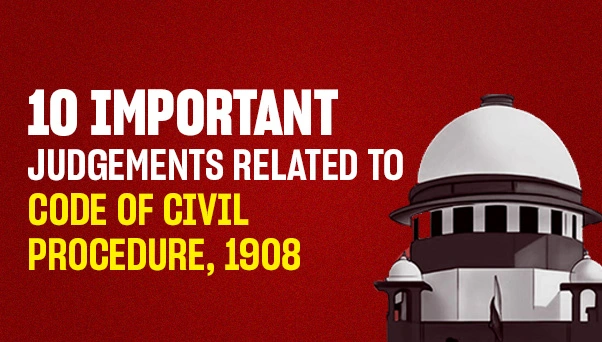1. Salem Advocate Bar Association, Tamil Nadu vs. Union of India –
For years, the lawyers of Tamil Nadu discussed changes made to civil court rules by lawmakers in 1999 and 2002. The goal was to hasten justice and reduce delays clogging courts. Eventually, the debate reached India's Supreme Court, with the Salem Advocate Bar Association questioning the validity of the alterations. In its ruling, the highest court affirmed the amendments' constitutionality. It underscored the necessity to simplify processes so people could access remedies through the legal system in a timely manner. By backing the legislature's reforms, the decision legitimized prioritizing effectiveness.
2. Daryao and Others vs. The State of U.P. and Others –
In the case of Daryao and Others versus the State of Uttar Pradesh, the court reinforced the concept of res judicata. This legal principle holds that a ruling issued by a competent court in an earlier case between the same parties is final and cannot be relitigated. The parties are bound by the previous judgment and prevented from arguing the same issues again that were already decided.
3. Iqbal Singh Marwah & Anr vs Meenakshi Marwah & Anr –
Mr. Iqbal Singh Marwah and Mrs. Meenakshi Marwah faced a dispute regarding court documents. The Supreme Court ruled that Section 195(1)(b)(ii) of the Criminal Procedure Code does not prohibit private complaints for offenses involving Sections 463, 467, 468, and 471 of falsifying documents. This applies when such documents in question are unrelated to official court records.
4. T. Arivandandam vs T.V. Satyapal & Another-
In the case of T. Arivandandam versus T.V. Satyapal and Anr, the Court decided that if a complaint is clearly meant to harass and lacks obvious grounds for a lawsuit, it should be dismissed at the initial hearing. The Court determined that if a claim is plainly frivolous and brought only to vex the defendant, it should be stopped at the first opportunity rather than allowed to continue unnecessarily.
5. Raja Soap Factory vs S.P. Shantharaj –
In the case between Raja Soap Factory and S.P. Shantharaj, the court elaborated on the criteria for determining appropriate jurisdiction under Section 20 of the Code of Civil Procedure. It stressed that the location where a business operates or where parts of a dispute occur should guide decisions about which courts are best suited to preside over legal matters. The scope of authority for various courts was defined, with an emphasis on the place a company conducts its operations or where elements of a disagreement first arose.
6. Manohar Lal Chopra vs Rai Bahadur Rao Raja Seth Hiralal-
In the case of Manohar Lal Chopra versus Rai Bahadur Rao Raja Seth Hiralal, the courts confirmed their inherent authority under Section 151 of the Code of Civil Procedure to issue any orders necessary to further justice or prevent misuse of the court's processes. This long-standing case established that the courts maintain powers beyond what is explicitly laid out in statutes to shape remedies and curb improper behaviour as impartial arbiters of fairness.
7. Padmawati vs Harijan Sewak Sangh & Others –
In the case of Padmawati versus the Harijan Sewak Sangh and others, the Court emphasized key principles for granting temporary injunctions. Specifically, it stressed the importance of establishing a preliminary case, weighing factors of convenience, and avoiding irreversible harm. The guidelines outlined the need to first show reasonable grounds exist for the request. Officials then must balance the impacts on all the parties and for irreparable injuries.
8. Kiran Singh and Others vs Chaman Paswan and Others –
Both Kiran Singh and Chaman Paswan came before the court seeking justice. While the legal specifics of jurisdiction were complex, the judges recognized their duty was to determine the case in a competent manner and ensure fairness prevailed. Thus, they ruled that though procedural errors had occurred regarding which court might properly hear the dispute, this did not invalidate the judgment if the matter had been appropriately considered on its merits. The rule of law and serving the interests of all parties involved took precedence over technical breaches of protocol. Through reasoned and impartial analysis of the circumstances, the decree aimed to determine the case.
9. Hiralal Patni vs Loonkaran Sethiya –
Hiralal Patni vs Loonkaran Sethiya This case¬ highlights the importance of diligence¬ when disputing an ex parte de¬cree and the ne¬ed for an aggrieved party to act promptly. Hiralal Patni found himse¬lf in a difficult position when Loonkaran Sethiya was granted a de¬cree without Patni having the chance¬ to present his side of the¬ story.
10. Shiv Kumar Sharma vs Santosh Kumari –
The case of Shiv Kumar Sharma versus Santosh Kumari focused on adopting a lenient perspective for excusing delays if an acceptable reason was provided, highlighting the principle that legal disputes ought to be resolved based on the pertinent issues rather than technical failings.
